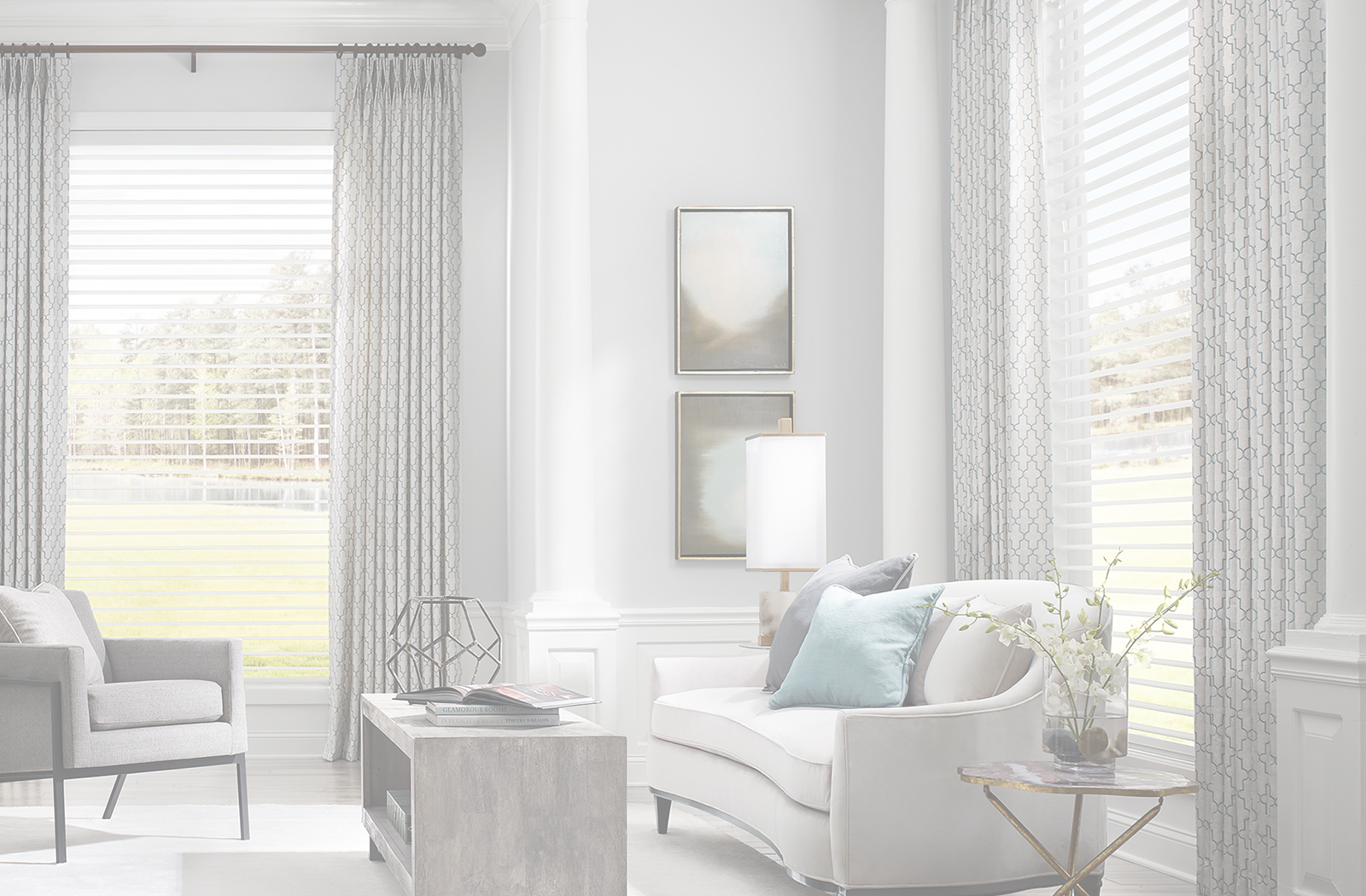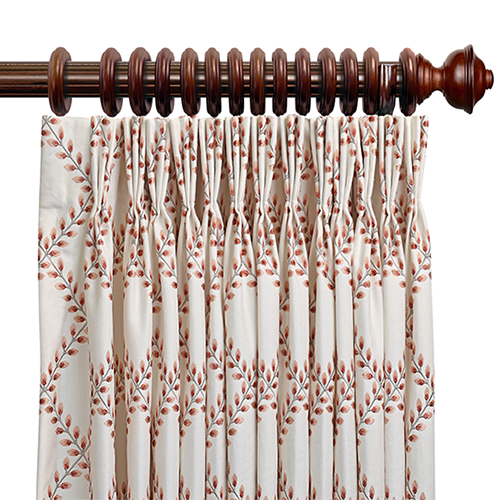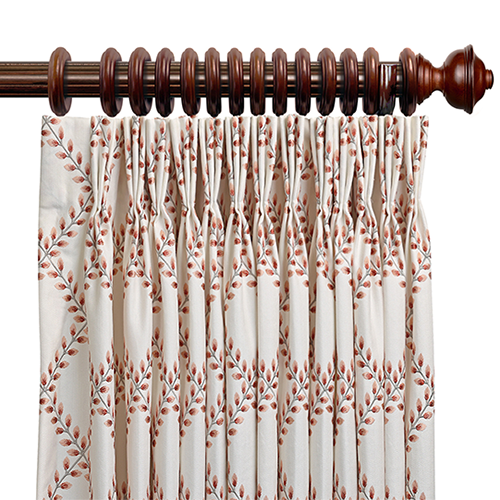
×


Pinch Pleat Drapery
Selection Guide
The Step-by-Step Guidelines below correspond to the various options in each drop-down.
- 1. Choose a Collection: We offer seven Fabric Collections. Selecting any of the Collections will display the fabric options available under that category. You are free to move back and forth among the Collections to view all of the Fabrics we offer.
- 2. Select a Fabric: Each Collection contains a number of different Fabric choices. For each Fabric you have the option to: (a) view a larger image (by clicking on the magnifying glass in the upper right corner); (b) add a Free Swatch to your cart; or (c) select the Fabric you prefer for for your drapery panels. If you are ready to order simply click on your Fabric choice. The Fabric will be outlined in Red and you can then move to the next drop-down.
- 3. Width: Select the Width in inches you want your drapery to be. Width is the same for a Pair or a Panel. Our workroom will add for Overlaps (where the fabric meets in the middle on a split-draw drapery) and Returns (the amount of fabric that wraps around the end of the drapery rod and 'returns' to the wall).
- 4. Length & Length Fraction: The Length you choose will be the exact length you receive. We do not make additions or deductions for drapery rod style or floor clearance. Select the Length in inches and Fractional Length if you prefer, for example, that your panels be 84 1/2" long.
- 5. Pair or Panel: A Pair of pinch pleat draperies stack on each side of the window, and when closed, 'meet' in the middle. Select a Pair over a Panel when your window/room configuration allows, as it provides a more aesthetically pleasing and balanced look. A Panel stacks to either the Left or Right, and closes from one side only to cover a window. Typically, a Panel is used when it is the only option, for example with windows that butt into a wall or for some sliding-door and french-door configurations.
- 6. Return: Returns refer to the fabric on the end of a drapery panel that turns the corner from the drapery rod and 'returns' to the wall. The Return serves two functions: first it provides a clean, finished look; second, it eliminates the gap between the front of the drapery and the wall to reduce light leakage. When choosing your Return, select 4" Standard Return for most single rod installations. If you are installing two rods (one in front of the other), or if you need more clearance, select 6" Extended Return.
- 7. Lining: Lining is a second layer of fabric sewn to the back of the Fabric you select. A Privacy Lining reduces (but does not eliminate) the amount of light allowed through the Panel, and aids in insulation. A Lining also presents a more uniform 'look' from the outside, as the Lining fabric is displayed to the outside rather than the face Fabric. Lining can also serve to protect the face Fabric from the damaging effects of the sun.
A note regarding Fullness: Our Pinch Pleat Draperies are made with 2.5:1 Fullness. 'Fullness' is the ratio of fabric used in drapery to cover a space. For example, 2.5:1 Fullness for a Pinch Pleat Drapery installed on a 100" wide rod means we use 250" of fabric to make your pinch pleat drapery.
Questions? 800-251-5009
×


Pinch Pleat Drapery
MEASURING FOR A PINCH PLEAT DRAPERY
- It's important to consider how you want your drapery to look as well as function before you place your order. Here are some points to consider when you measure for your drapery.
-
1. Width
- For a functional drapery that fully opens and closes, measure the window opening and then add for Stack-Back. Stack-back allows your draperies to cover wall and window frame rather than glass when your draperies are drawn-back. Adding stack-back has the added advantage of making your window look larger.
- For a split-draw drapery add stack-back to each side, for a one-way panel add stack-back to the side the drapery will stack to.
- Referenced at the bottom of this page is the Kirsch Pinch Pleat Stack Guide. The draperies we offer are 2.5 times fullness, which is the middle column of the Guide. Please note that this Guide is an estimate, as various fabrics will have more or less stack-back based on fabric composition and lining choice.
- As an example, in the case of a window opening measuring 84” wide, we add a total of 30" for stack-back (15" for each side), giving us a total drapery width of 114”. This is the measurement you enter for the width of your drapery. Our workroom adds the overlap (where the fabric overlaps in the center for a split-draw drapery) and returns (the fabric that turns the corner at the end of the rod and goes back to the wall) to your measurement.
-
2. Width for Stationary Panels
- Stationary Panels are non-functioning panels that appear as if they could open and close but do not. As they will not function, there is no need to pay for a full-width drapery.
- In this case, again, take stack-back into consideration when determining rod width. The idea is to cover wall and window frame and not glass. In most cases ordering your drapery at one-half actual width is sufficient. In other words, from the example above we have a window opening of 84”. We add 30” stack-back for a total of 114”. For stationary panels in this case, order your drapery at 57”.
- Note that for smaller windows (such as a 48” wide drapery, for example) we recommend ordering a full width drapery in order that the panels do not appear too 'skimpy'. Stationary panel sizing is more often art than precision. Feel free to call us with questions.
-
3. Length
- The three most common lengths for functional draperies are Ceiling to Floor, Above the Frame to Floor, and Above the Frame to Below the Frame.
- Ceiling to Floor. This is the most difficult length measurement as there is no room for error. Measure from the ceiling to the floor in multiple spots. For wider windows it is not uncommon to have a difference in length of up to ½”. Take the shortest measurement as your starting point. Next, deduct the appropriate amount for your drapery rod. In most cases your drapery will hang beneath the Drapery Rod. This means you must determine the amount to deduct from your drapery length based upon (a) the type of drapery rod you choose, and (b) where the drapery 'hangs' in relation to the top of that rod. Lastly, take a deduction for Floor Clearance. We recommend a deduction of ½” to ¾” for Floor Clearance. Feel free to call us for assistance with Rod Deduction and Floor Clearance.
- Above the Frame to Floor. Choose the spot above the frame where you will be installing your drapery rod. Assuming you have 8-foot ceilings, we generally recommend installing the rod half-way between the top of the frame and the ceiling. This again is more art than science, as higher ceilings and crown molding change the calculation. The bottom line is that you want your draperies to hang higher rather than lower, as longer panels will give the room 'height'.
- Above the Frame to Below the Frame. The general rule is two or three inches above the frame and two or three inches below the apron. The apron is the trim below the window sill.
- The last point to mention regarding length is 'puddling' or 'pooling'. This is where the draperies have a gentle break on the floor. An additional 2” of length is generally sufficient. Puddling or pooling is not recommended with functional draperies.
Proper measuring for draperies is critical. We've worked with draperies and drapery hardware for decades. Reach out to us with any questions.
Questions? 800-251-5009
1
/
of
1
Drapery Rods Direct | Starting at $94.50
Couldn't load pickup availability
Regular price
$0.00
Regular price
Sale price
$0.00
Unit price
/
per
Shipping calculated at checkout.
Additional Information
Additional Information
- Custom Pinch Pleat Draperies are made-to-order, ship in 2 to 3 weeks, and are non-returnable.
- We recommend ordering Swatches prior to placing an order. Feel free to order up to 8 Swatches.
- To view all Swatches on one page, click here.

PRODUCT INFORMATION:
-
SHIPPING & RETURNS:
Custom Pinch Pleat Draperies are made-to-order, ship in 2 to 3 weeks, and are non-returnable. We recommend ordering Swatches prior to placing an order.
-
APPLICATIONS:
Pinch Pleats Draperies are seen in homes, offices, and commercial establishments. They can be installed with a focus on functionality or design.
-
NEED ASSISTANCE?
Selecting Custom Drapery Panels can seem daunting. We're available to discuss your options. Feel free to call us at 800-251-5009

